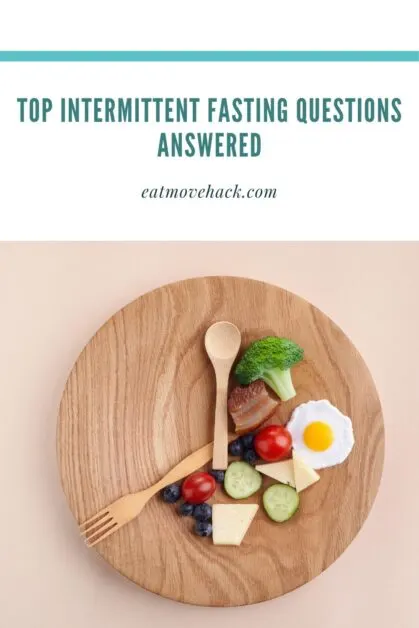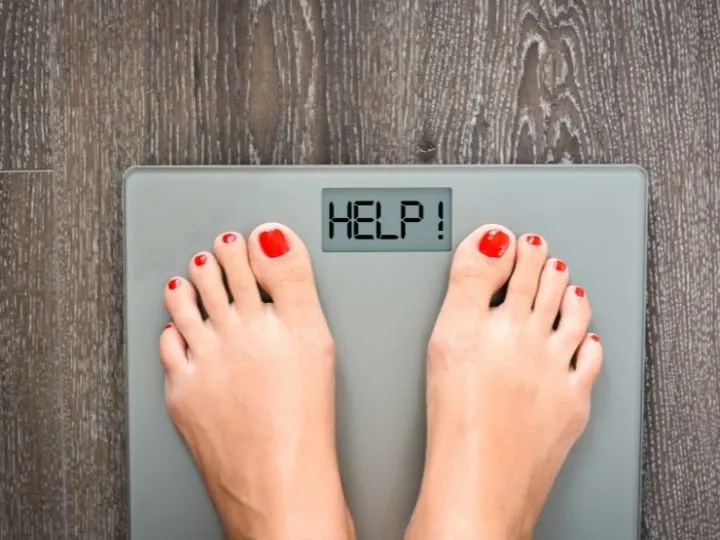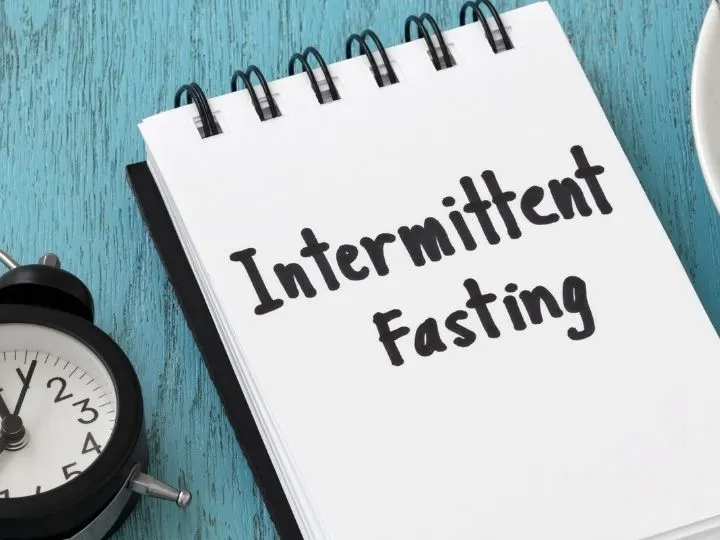Some of the links in this post are affiliate links. This means if you click on the link and purchase the item, we will receive an affiliate commission from the vendor at no extra cost to you. These business relationships allow us to keep bringing you great EatMoveHack content. All opinions remain our own.
Updated 1/14/22
Intermittent fasting is an interesting way to change your relationship with food. While it can do wonders to boost weight loss, it can also reduce your chances of developing diabetes and heart disease.
We’re sure you’re wondering how intermittent fasting works and why you should consider it for yourself. To help you gather as much information as possible, we’ve answered the most frequently asked questions about intermittent fasting below. Keep reading for a crash course on this unique way of dieting.

Frequently Asked Questions About Intermittent Fasting
At its core, intermittent fasting is quite a simple concept. Perhaps because of that simplicity, many people tend to have lots of questions about how it works, why it works, and whether it’s a good fit for their particular circumstances. Let us answer these common questions and more below.
Intermittent Fasting 101

What is Intermittent Fasting?
Simply put, intermittent fasting (IF) is the practice of time-restricted eating. Fasting means not eating, so with IF, you consciously establish periods of time when you’ll eat and periods of time when you won’t.
If you stop to think about it, everyone already intermittently fasts to some degree. When you go to bed at night, you enter a period of fasting that typically lasts 6 to 9 hours, depending on your sleep schedule and when you last ate.
In the morning, you’ll continue your fasted state until you sit down for a substantial meal. This is where the term breakfast (“break fast”) comes from.
What are the Different Types of Intermittent Fasting?
There are several different types of intermittent fasting, identifiable by the lengths of their eating periods and fasting periods. Here are some of the most common:
- 16:8 — A 16:8 intermittent fasting schedule means that your fasting period lasts 16 hours and your eating window lasts 8 hours. This schedule usually has you stop eating after dinner, with you fasting during your sleep time and lasting through the next day. You generally skip breakfast and then begin eating around lunchtime. If you’d like to practice a more restrictive schedule, you might choose a 18:6 or 20:4 schedule instead.
- 5:2 —With a 5:2 intermittent fasting schedule, you’ll eat without restrictions for 5 days and practice fasting for 2 days. During your fasting days, you don’t have to go completely without food. Instead, you’ll reduce your calorie intake to just 5oo to 600 calories, spread out over two small meals.
- 24-hour fasts — With a 24-hour fast, you only eat one meal per day. Most people choose to make lunch or dinner their one meal, so if you follow this method, you might have dinner today and then enter a 24-hour fasting window that ends with tomorrow’s dinner.
- Alternate-day fasting —With alternate-day fasting, you fast for a full day every other day. This means that during your eating window, you eat without restrictions. During your fasting window, you can choose to eat nothing at all or up to 500 calories.
How Long Does it Take for Intermittent Fasting to Work?
An amazing thing about intermittent fasting is that it doesn’t take long to start affecting your body. You may not be able to see everything that’s happening right away, but with continued practice, you’ll definitely start to feel it. What intermittent fasting does to your body can be broken down into two categories: cellular cleansing and weight loss.

Cellular Cleansing
During cellular cleansing, your body essentially goes through a reset. Here’s what to expect.
Intermittent Fasting for 1 to 12 Hours
Shortly after you have digested your last meal, your body will enter a phase known as ketosis. During ketosis, your body looks to itself for fuel and starts to break down your fat stores. The burning of these stored fats creates ketones, which are then used for fuel.
Intermittent Fasting for 12 to 18 Hours
As you continue to fast, your body starts burning even more ketones. At this point, you can start to see elevated levels of ketones in your body. This is why insulin sensitivity is so important.
With insulin levels under check in your blood stream and your body sensitive to insulin release, your body is then able to access your stored fat during these fasted windows.
Intermittent Fasting for 18 to 24 Hours
After 18 hours of fasting, your body begins to enter the coveted zone of autophagy. This is when your body sacrifices its weak cells and protects the strong — an actual survival of the fittest competition happens inside your own body, with weak or damaged cells being recycled by your body for fuel. Authophagy is the accelerator of cellular rejuvenation.
Intermittent Fasting for 24 to 48 Hours
If you can hang in there and make it past one full day of fasting, the results really start adding up. Your body, rather than looking to continue to destroy itself, looks to double down on the strong. Remember, we have sacrificed the weak cells and are left with the strong.
So to protect and grow the strong cells, your body begins to flood itself with human growth hormone. That’s right: the stuff that professional athletes and celebrities have been injecting for years to regain their youth. You can actually create your own with nothing more than fasting.
Intermittent Fasting for 48 Hours and Beyond
After 48 hours of fating, your insulin levels will be extremely low. Your body will become highly insulin sensitive, which is a good thing. Your body will also continue to burn fat for fuel and regrow cells in a stronger, more healthy fashion.
It takes patience and practice to move into the periods of long-duration fasting, and it’s not for everyone. There are massive benefits to reap at fasts up to 24 hours or even 36 hours. But if you want to push longer, there are accelerated benefits to realize.
Weight Loss
When you fast, your body burns fat. So long as you don’t consume more calories than you burn, you’ll lose weight. So naturally, the next question is: How long until I start seeing meaningful weight loss? Let’s do some simple math on this one to ensure that you understand what is feasible.
Let’s first assume that you fast for a full 24 hours, only consuming water, black coffee, or black tea. There are no calories here, you so your daily caloric intake is 0.
Now we must consider how many calories a normal person burns through the simple process of daily life. To keep things simple, we’ll say that the resting metabolic caloric rate for the average person is 1,600 calories per day. We’re not going to assume any exercise that would burn additional calories.
Keeping in mind that there are approximately 3,500 calories in a pound of fat and you burn 1,600 calories per day just by living, fasting for an entire day will result in a net loss of 1,600 calories — that translates to roughly 1/2 pound in weight loss for that 24-hour period.

Do I Have to Count Calories While Intermittent Fasting?
With traditional intermittent fasting, it’s not necessary to track your calorie intake. It is advisable, though, that you concentrate on establishing good eating habits. This means practicing a diet where you’re eating healthy fats, plenty of lean meats, and nutritious fruits and vegetables.
Now, if you’re using intermittent fasting as a way to lose weight, you’ll definitely want to be sure that you consume fewer calories than you burn, as creating a caloric deficit is the only way to shed pounds.
Intermittent Fasting and Your Health
Is Intermittent Fasting Safe?
Intermittent fasting is safe for most people, but it might not be right for everyone. For example, if you suffer from particular health issues, such as diabetes or kidney damage, or have a history of eating disorders, skipping meals could lead to dangerous conditions.
What Are the Health Benefits of Intermittent Fasting?
Intermittent fasting has a long list of health benefits. It can:
- reduce insulin resistance and lower your overall blood sugar levels, which can help prevent the onset of diabetes
- help boost your metabolism and burn fat for better weight management
- reduce stress, alleviate inflammation, and increase your energy levels for better overall health
- improve health issues, such as high blood pressure, that could lead to heart disease
- repair cells and reduce your risk for developing cancer
Could Intermittent Dieting Be Bad?
Is Intermittent Dieting the Same as Starvation?
Intermittent fasting is a far cry from starvation. Deciding to skip breakfast or go a day or two with minimal calories is nothing like the suffering that comes with starvation, which occurs after many days and is marked by an extended lack of vital nutrients.
It’s interesting to note that humans have moved into a unique point in human history where the amount of food is a risk to our health, not because of scarcity, but rather because of excess availability.
Not only is the amount of food a problem, but the nature of the food is also challenging to long-term health. The caloric density of our food has increased with easier and easier processing methods.
We’ve reached a point in our evolution where the amount of calories we can consume is seemingly endless, so how do we quell the tide? This is where intermittent fasting can find a reasonable place in our lifestyle.
What’s Better: Eating More or Eating Less?
In the past several years, the prevailing message we’ve heard about the frequency of eating is to increase it. We’ve heard things like, “breakfast is the most important meal of the day” and “more and smaller meals throughout the day will help speed up your metabolism.”
This kind of makes sense when you think of your metabolism in a simple way, like a burning fire. If you want to keep a fire burning, what do you do? You keep it fueled with more wood. The more wood you provide, at more regular intervals, the more stable and intense the fire remains. This is the theory behind the “eat more” movement.
But metabolism really isn’t that straightforward. Eating frequently doesn’t increase your capacity to burn more calories. Rather, it simply means your body has to keep working from morning to evening trying to burn all that food. Also, for many people who eat late into the evening, this also means burning food while sleeping, which can cause sleep problems.
Just like you don’t want to leave your car engine running all day, you don’t want your body’s digestive system running non-stop. It is meant to cycle on and off, more like an air-conditioner rather than a fire.

What Are the Side Effects of Intermittent Fasting?
You’ve learned about the many health benefits of intermittent fasting, but you should also know that transitioning to this way of life can come with side effects. As with most big changes, these side effects are usually temporary and rarely a cause for concern.
The biggest side effect of intermittent fasting is hunger. This isn’t surprising considering that depending on the fasting method you choose, you may go many hours without food.
Along with hunger, you may also experience dizziness, headaches, lack of energy, and nausea as your body makes the change from fueling itself with food to fueling itself with fat stores and ketones.
Many people report that these symptoms get better the longer they practice intermittent fasting, so you may need to allow some time for your body to become accustomed to its new eating schedule.
Intermittent Fasting Basics
Can I Eat Anything During Intermittent Fasting?
There are no restrictions as to what you can eat during your feeding window. However, keep in mind that you’ll feel better and enjoy better success during extended periods of fasting when you concentrate on healthy diet. While it’s perfectly fine to feast during your feeding windows, you shouldn’t overdo it for the sake of it.
Can I Drink Liquids While Intermittent Fasting?
During your feeding windows, you can drink anything you’d like. During your fasting periods, you can drink coffee (black with no sugar), unsweetened tea, and plain water with no restrictions as these beverages have no calories and will not knock you out of a fast.

Can I Take Supplements While Intermittent Fasting?
You can definitely continue to take your regular supplements while intermittent fasting, so long as they don’t have calories and can be consumed on an empty stomach. If you’re unsure whether it’s safe to take a particular supplement or medicine while fasting, consult your doctor for advice.
What Does It Take to Break a Fast?
While more research on the matter is needed, current studies show that it takes the consumption of 60 or more calories to break a fast. This means that enjoying a cup of black coffee in the morning without sugar isn’t enough to break a fast.
However, eating a slice of toast (75 calories), a cup of yogurt (100 calories), or a large banana (120 calories) is enough to break your fast and switch you to an eating period.
Intermittent Fasting and Weight Loss
Can Intermittent Fasting Help Me Lose Weight?
Many people practice intermittent fasting with the primary goal of losing weight. Because your body switches to the burning of your stored fat when you’re not eating, this type of diet can be an excellent way to lose fat and reduce your body weight.
It’s important to note that intermittent fasting on its own will not lead to weight loss, especially if you’re consuming more calories per day than you burn.
In order to lose weight, you need to take in fewer calories. You can ensure you stay on track with your weight loss goals, particularly in the beginning, but monitoring your food intake and keeping careful note of how many calories you’re consuming.

Is It Safe To Work Out During Intermittent Fasting?
While you may suffer from low energy and fatigue when you first start intermittent fasting, it’s still safe to exercise so long as you follow safe practices.
You should avoid lifting weights and completing other intense activities until your body gets used to the new diet. Cardio and low-impact resistance training is fine, so long as you listen to your body and don’t push yourself too hard.
Does Fasting Cause Muscle Loss?
Intermittent fasting is great for fat burning, but if you’re not careful, you might also see a reduction in your muscle mass. This is because your body will turn to its own fat and muscle stores for fuel when it can’t get it from food.
As protein is essential for the development of muscle, you’ll want to make sure you fill your plate with lots of lean meats and other forms of healthy protein during your feeding windows.
If you reduce your caloric intake but consume mostly carbs and fats, you’ll see fat loss, but you won’t have the building blocks for maintaining or creating muscle.

Does Fasting Slow Down The Metabolism?
It’s a common misconception that your metabolism speeds up when you eat food. Rather, it speeds up when you don’t eat food because your body has to work harder to look for alternative sources of fuel.
The longer you fast, the better your body becomes at fat burning. Over time, it will deplete stored fat, leading to fewer pounds on the scale, not weight gain.
Help with Intermittent Fasting
How Do I Start Intermittent Fasting?
The first thing to do when considering intermittent fasting is to decide on a schedule. Pick eating windows and fasting periods based on your experience with fasting and what you hope to achieve with this type of diet.
If you’re a beginner, consider starting with a 16:8 schedule. You’re always free to change or adjust it as you progress.
What Should I Eat While Intermittent Fasting?
While you can technically eat anything you’d like during a feeding window, you should concentrate on establishing good eating habits.
The longer that you practice intermittent fasting, the more likely you’ll naturally consume fewer calories. This is great for burning fat and weight loss, but it leaves you fewer opportunities to get the vitamins and minerals you need to lead a healthy life.
When deciding what to eat, focus on lean meats, fresh veggies, healthy fats, and moderate carbs.
How Do I Manage Hunger Pangs While Intermittent Fasting?

It’s completely normal to feel hungry as your body adjusts to intermittent fasting. While there are some tricks you can use to distract yourself from the lack of food, you generally just have to power through the discomfort.
If it’s especially bad, you may be trying too much, too quickly. Consider scaling back your fasting windows and slowly building back up to longer periods.
Here are some tips for managing hunger while fasting:
- Don’t mistake thirst for hunger. Drink a glass of water or tea. If you were thirsty, you should feel better. If you were actually hungry, having liquid in your stomach will help.
- Make better food choices. When you enter an eating period, don’t reach for sweets and junk food. Instead, fill your plate with healthy proteins and fats that will satisfy your immediate hunger and help keep you feeling full longer.
- Distract yourself. Some people tend to eat out of boredom rather than hunger. If you think this might be you, take your mind off food by engaging it in something else. Go for a walk, watch some TV, or exercise.
Wrapping Up
You only need to look at the benefits of intermittent fasting to see how much it can improve your well-being. In addition to reducing your risk of various illnesses, it can also burn stubborn body fat and improve your mood and energy levels.
We hope that we were able to answer your most pressing questions about intermittent fasting, but if there’s anything else you’d like to ask, don’t hesitate to reach out.
Having trouble shedding pounds despite your new way of eating? Check out some of the most common reasons you’re not losing weight while intermittent fasting and get tips on how to break your stall.

